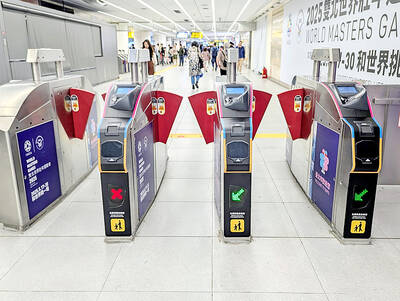Minister of Transportation and Communications Mao Chi-kuo (毛治國) said yesterday that the ministry will ask the Bureau of High Speed Rail to check if there is any earthquake alarm technology for high-speed trains that will help the Taiwan High Speed Rail Corp (THSRC) react quicker in the event of big quakes.
“The THSRC adopted its earthquake-resistance mechanism following the 921 earthquake in 1999, and incorporated some of the best technologies available back then. The train system can actually withstand a magnitude 7 earthquake,” Mao said. “I have asked the bureau to see if there are any new technologies available.”
Regarding a proposal to establish an earthquake alarm system like that used in Japan, Mao said that the ministry would listen to opinions from experts as the situations in Taiwan and Japan are different. He said that most metropolitan areas in Japan are on its east side, so it installed electric cables along the Pacific coastline with the hope of buying some time when issuing an earthquake alarm.
“The metropolitan areas in Taiwan are mostly on the west side. However, many of the faults are on land. If an earthquake happens, we hardly have any time to react in advance,” Mao said
The bureau’s director-general Ju Hsu (朱旭) said that the THSRC had considered using the same system as in Japan’s Shinkansen system, but Japanese engineers said it would not work for Taiwan.
Mao was asked to brief the legislature’s Transportation Committee yesterday on new measures the ministry was planning to execute this year. Both the Democratic Progressive Party and the Chinese Nationalist Party (KMT), however, questioned Mao over problems facing the nation’s high-speed rail system.
Mao said that the THSRC’s earthquake resistance system had ensured the safety of passengers when a 6.4-magnitude earthquake struck Taiwan last week.
What the company could work to improve is the time it takes to move passengers from stranded trains to safer locations, he said.
The THSRC has had to cut back its services since the quake to repair damage, offering only non-reserved seating, which has angered passengers who purchased advance tickets. It is scheduled to resume normal operations today.
Mounting public anger saw Premier Wu Den-yih (吳敦義) visit Taipei Train Station yesterday for a briefing from THSRC chairman Ou Chin-der (歐晉德).

A magnitude 6.4 earthquake struck off the coast of Hualien County in eastern Taiwan at 7pm yesterday, the Central Weather Administration (CWA) said. The epicenter of the temblor was at sea, about 69.9km south of Hualien County Hall, at a depth of 30.9km, it said. There were no immediate reports of damage resulting from the quake. The earthquake’s intensity, which gauges the actual effect of a temblor, was highest in Taitung County’s Changbin Township (長濱), where it measured 5 on Taiwan’s seven-tier intensity scale. The quake also measured an intensity of 4 in Hualien, Nantou, Chiayi, Yunlin, Changhua and Miaoli counties, as well as

Credit departments of farmers’ and fishers’ associations blocked a total of more than NT$180 million (US$6.01 million) from being lost to scams last year, National Police Agency (NPA) data showed. The Agricultural Finance Agency (AFA) said last week that staff of farmers’ and fishers’ associations’ credit departments are required to implement fraud prevention measures when they serve clients at the counter. They would ask clients about personal financial management activities whenever they suspect there might be a fraud situation, and would immediately report the incident to local authorities, which would send police officers to the site to help, it said. NPA data showed

ENERGY RESILIENCE: Although Alaska is open for investments, Taiwan is sourcing its gas from the Middle East, and the sea routes carry risks, Ho Cheng-hui said US government officials’ high-profile reception of a Taiwanese representative at the Alaska Sustainable Energy Conference indicated the emergence of an Indo-Pacific energy resilience alliance, an academic said. Presidential Office Secretary-General Pan Men-an (潘孟安) attended the conference in Alaska on Thursday last week at the invitation of the US government. Pan visited oil and gas facilities with senior US officials, including US Secretary of the Interior Doug Burgum, US Secretary of Energy Chris Wright, Alaska Governor Mike Dunleavy and US Senator Daniel Sullivan. Pan attending the conference on behalf of President William Lai (賴清德) shows a significant elevation in diplomatic representation,

The Taipei MRT is to begin accepting mobile payment services in the fall, Taipei Rapid Transit Corp said on Saturday. When the company finishes the installation of new payment units at ticketing gates in October, MRT passengers can use credit cards, Apple Pay, Google Pay and Samsung Pay, the operator said. In addition, the MRT would also provide QR payment codes — which would be compatible with Line Pay, Jkopay, iPass Money, PXPay Plus, EasyWallet, iCash Pay, Taiwan Pay and Taishin Pay — to access the railway system. Currently, passengers can access the Taipei MRT by buying a single-journey token or using EasyCard,